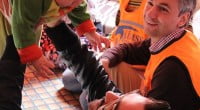Deepening crisis

Date posted: December 23, 2013
NICOLE POPE
As the Turkish government clamps down on protesters and attempts to hinder the corruption probe, Turkey is plunging deeper into a crisis that threatens to have a lasting impact on its society and economy.
The corruption case is the main story. With every move made to protect those in its immediate circle, the government is stepping away from the rule of law and undermining its reputation further.
Prime Minister Recep Tayyip Erdoğan has returned to his Gezi rhetoric, blaming all and sundry for recent events. He is apparently oblivious that his confrontational style of governance, his casual dismissal of all opposing views and the high-handed way in which he has been ruling for the past few years have led to the crisis he is currently confronting. By governing alone, Erdoğan has made himself an obvious target.
The timing of the arrests and the broader context in which they took place, however, are not mere details or footnotes in a story that has exposed the government’s vulnerability. They are irrelevant in terms of the need to ascertain the facts about the bribery and ensure the culprits are punished, which are clearly the main priority. But in the broader context of improving Turkey’s democratic standards, they matter greatly. Can we state with certainty that these allegations would have surfaced now if the Gülen movement had not been involved in a feud with the government?
Rumors of corruption, particularly about the Housing Development Administration of Turkey (TOKİ), had been circulating for years. By targeting members of the press and enlisting the help of media group owners in doing so — Nazlı Ilıcak of the Sabah newspaper has now joined a long list of commentators dismissed from their jobs — the Justice and Development Party (AKP) had, until now, largely succeeded in preventing journalists from digging too deep. But we, as members of the media, are not blameless.
The recently revealed 2004 National Security Council (MGK) document which showed that the government had agreed to act against the Gülen community was clearly of public interest. But who, in the past nine years, knew of its existence, and why did it take so long to surface? Was the need to inform the public less pressing when the alliance which led to the prosecution of the Ergenekon and Sledgehammer suspects was still strong?
These are troubling issues, as are the existence of certain sex tapes circulating on the Internet and veiled threats of further revelations on all sides. The court cases against the coup suspects were also based on leaks of vital documents. During the judicial process, curbing the military’s power was the main objective, and legal shortcuts or unfair arrests of peripheral figures were sometimes overlooked.
The generals were rightly sidelined, but due to the shortcomings of the judicial process, many crimes committed by the state, particularly in the Southeast, were not investigated, and the cases made a limited contribution to the country’s democratization. Instead, the authoritarianism of the military was adopted by the civilian rulers, abandoning their reformist promises.
If Turkey still lacks the adequate mechanisms to hold politicians and their relatives legally responsible for illegal activities, and if a fair trial in a court of law is still a challenge, how much progress have we really achieved in the post-military tutelage “new Turkey,” which has also failed to adopt a more liberal constitution?
The corruption probe could, in theory, prove to be a turning point leading towards more accountable governance. But there is also a significant risk that the heated exchanges between AKP supporters and their opponents, including the Gülen movement, will create new fault lines in an already polarized society and fuel another cycle of revenge and recrimination. This tension is not conducive to the creation of a climate in which justice can operate impartially and the principles of transparency and accountability can flourish.
Source: Today's Zaman , December 23, 2013
Tags: Defamation of Hizmet | Freedoms | Turkey |
























